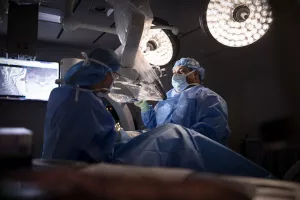When a skull base tumor or aneurysm starts to impact your daily life, the right care can make a difference. We use precise, minimally invasive skull base surgery to reach this area safely and treat complex conditions. You get expert support, straight answers and a plan that helps you move forward with confidence.
Getting to the base of your care: Expert skull base surgery
A skull base tumor, aneurysm or other growth can affect your daily life, and hearing that you need surgery can be unsettling. With more than 30 years of experience, our team provides safe, precise care designed around you and your goals.
From your very first visit, we focus on making sure you feel informed and supported. Our team of specialists works together to review your scans, health history and treatment options so nothing is missed. This collaborative approach helps you get the safest, most precise care and answers your questions every step of the way.
Using advanced, minimally invasive techniques and state-of-the-art tools, we prioritize safety and precision. Our goal is to help you feel informed, confident and in control while maintaining your quality of life.

Conditions
Skull base surgery may be recommended to treat tumors, growths or other changes at the base of your skull, around your ears or near your eyes. These conditions can affect important nerves, blood vessels and structures, which may impact vision, hearing, balance, speech or movement. We treat a wide range of skull base conditions, including:
- Acoustic neuromas (vestibular schwannomas): Noncancerous tumors on the nerve connecting the inner ear to the brain, affecting hearing and balance
- Aneurysms and vascular malformations: Weak or abnormal blood vessels that may affect brain function
- Cerebrospinal fluid (CSF) leaks: Openings that allow fluid around the brain to leak, sometimes needing repair
- Chordomas: Rare tumors developing from bone at the base of the skull or spine
- Cranial nerve tumors (facial, trigeminal, glossopharyngeal): Tumors on nerves that control face movement, sensation or swallowing
- Cysts (dermoid, epidermoid, cholesterol): Fluid- or tissue-filled sacs that can put pressure on nearby structures
- Meningiomas: Tumors from the lining around the brain, sometimes at the base of the skull
- Orbital and inner ear tumors: Growths near the eyes or inner ear that may affect vision, hearing or balance
- Paragangliomas and glomus tumors: Rare skull base tumors near nerves and blood vessels
- Pituitary tumors and Rathke’s cleft cysts: Growths near the pituitary gland that can affect hormone levels and body functions
- Temporal bone and sinus tumors: Tumors in the ear or sinus area that can affect hearing, smell or surrounding structures
- Other skull base changes: Conditions such as basilar invagination or encephaloceles
Each skull base condition is carefully evaluated so we can create a treatment plan tailored to you. Our approach combines advanced minimally invasive techniques, expert surgical planning and multidisciplinary care to keep you safe, informed and confident throughout treatment.
Testing
Skull base surgery requires careful planning and a series of diagnostic tests to get a clear picture of your condition and plan the safest, most effective procedure. These tests help our team see the exact location of tumors, aneurysms or other growths, understand how they affect surrounding nerves, blood vessels and structures, and choose the best surgical approach for you. Common tests may include:
- Audiograms: Evaluate how well you can hear, which helps us understand any impact on your inner ear or hearing nerves
- Cerebral angiography: Offers a detailed view of the blood vessels in your brain, helping identify aneurysms or other vascular issues
- CT or CTA scans: Show clear pictures of the bones and blood vessels in your skull, giving a full view of the skull base structure
- MRI and MRA scans: Provide detailed images of your brain and blood vessels, helping the surgical team map out your procedure with precision
- Optical coherence tomography (OCT): A non-invasive imaging test that checks your eye health and optic nerves
- Pituitary hormone testing: Measures how well your pituitary gland is functioning, important for detecting any hormonal changes before surgery
Each test gives your care team the information needed to create a precise, personalized surgical plan. Our approach combines advanced imaging, expert planning and collaboration across specialties to keep you safe and supported. We’re here to make sure you feel informed, confident and prepared at every step of your care.
Treatments
Skull base surgery is often one part of a larger treatment plan. Depending on your condition, your care may also include medication, “watchful waiting” with regular MRI scans, Gamma Knife surgery or radiation therapy. Our goal is to create a plan that fits your needs, protects healthy tissue and supports your quality of life.
When performing skull base surgery, we focus on minimizing pain, risks and recovery time. Our surgeons specialize in minimally invasive and endoscopic procedures, often using very small incisions to remove tumors while sparing healthy tissue. Advanced tools and techniques we use include:
- Cerebral catheters: Thin tubes used to reach blood vessels in the brain
- CO2 laser: A precise surgical laser used to remove or shrink tissue while protecting healthy tissue
- Coils: Tiny devices that block abnormal blood flow in aneurysms
- Computer-guided surgical navigation systems: Technology that helps surgeons see exactly where they are in the skull and plan precise movements
- Flow diverters: Devices that redirect blood flow around an aneurysm
- Gamma Knife surgery: Targeted radiation that treats tumors and blood vessel abnormalities without open surgery
- Glues: Special medical adhesives used to seal blood vessels or malformations
- High-definition endoscopes: Thin, flexible tubes with cameras and lights that let surgeons see and reach tumors through small openings, including endoscopic endonasal approaches through the nose
- Stents: Tubes that help keep blood vessels open
- Surgical approaches that minimize brain movement: Techniques designed to reduce pressure or movement in healthy brain tissue during surgery
- Ultrasonic aspirators (CUSA): Tools that use ultrasonic energy to break up and remove tumors while protecting surrounding tissue
For tumors that require traditional or “open” surgery, our experienced neurosurgeons provide expert care for even the most challenging skull base conditions. Throughout every step, we focus on helping you recover safely and comfortably while keeping you informed and confident.
FAQs
Skull base surgery treats tumors and other conditions at the bottom of the brain and near skull openings. Surgery may be done using traditional techniques or minimally invasive methods. At Tufts Medicine, our neurosurgeons work with ENT and oncology specialists to provide precise, minimally invasive options whenever possible.
The base of the skull is the bottom part of your skull that separates your brain from your face and neck. It has openings for important nerves and blood vessels. Because this area is complex and delicate, conditions affecting it often need specialized care like skull base surgery.
Most skull base tumors are deep inside the head and cannot be felt from the outside. Symptoms usually appear when the tumor presses on nerves or blood vessels. Common signs include headaches, vision changes, or balance issues, which may lead to imaging and possible surgery.
It depends on the tumor’s type, size, and location. Some grow slowly and are benign, while others may affect vital nerves or blood vessels. Even benign tumors can cause problems if they press on critical structures. Our team uses detailed imaging and minimally invasive surgery to manage tumors while protecting your quality of life.
The risks of skull base surgery depend on the extent and location of the procedure. Common risks include infection, cerebrospinal fluid leakage, cranial nerve injury, postoperative bleeding, and complications from general anesthesia. Additional risks vary based on the tumor's size and location, the operation's duration, and your overall health. Fortunately, severe complications such as major strokes, pulmonary embolism, heart attack, paralysis, coma, or death are very rare.
- Endoscopic endonasal surgery: Usually a 2-day stay using a minimally invasive approach through the nostrils.
- Craniotomy (open surgery): Typically 2–3 days, depending on recovery and tumor location.
- Benign tumors: Often, no further treatment is needed after complete removal, aside from regular MRI scans. If part of the tumor remains, options may include Gamma Knife radiosurgery or careful monitoring.
- Cancerous tumors: Radiation therapy, sometimes in one session (radiosurgery) or over several weeks, is usually recommended. Chemotherapy or immunotherapy may also be needed, depending on the tumor type.
Acoustic neuromas (vestibular schwannomas) are almost always noncancerous. They typically do not spread to other parts of the body or invade the brain.
Acoustic neuromas usually have a distinct appearance on MRI scans, including their location, shape and widening of the internal auditory canal. Rarely, other tumors like facial nerve schwannomas can look similar.
Hearing loss is possible with an acoustic neuroma, even without treatment. Risk depends on hearing at diagnosis, tumor size and growth, and the treatment path chosen. Watching the tumor without surgery may also lead to gradual hearing loss.
Surgery for an acoustic neuroma is not a treatment for tinnitus. Some people may notice changes after surgery or Gamma Knife radiosurgery, but improvement is not guaranteed.
The orbit, or eye socket, contains the eye, eye muscles, blood vessels, nerves and other soft tissues.
An orbital surgeon is an eye specialist trained to treat conditions around the eye, including the orbit. They often work with neurosurgery and head-and-neck specialists to provide complete skull base care.
Endoscopic Endonasal Resection (EER) is a minimally invasive surgery that uses an endoscope, a small camera, inserted through your nose to reach the skull base. Your surgeon will maneuver instruments to this area to open a small hole in the bone where the pituitary gland sits, in a depression called the Sella. This approach allows us to remove tumors of the pituitary gland and surrounding areas. EER treats various types of tumors, including pituitary adenomas and meningiomas.
Risks vary depending on the procedure and tumor location. Common risks include:
- Anesthesia complications
- Bleeding
- Cerebrospinal fluid leaks
- Cranial nerve injury
- Infection
Serious complications like stroke, heart attack, paralysis, coma or death are very rare.

From regular office visits to inpatient stays, find the healthcare you need and deserve close to home.

Meet the doctors and care team devoted to supporting you along your path to better health.